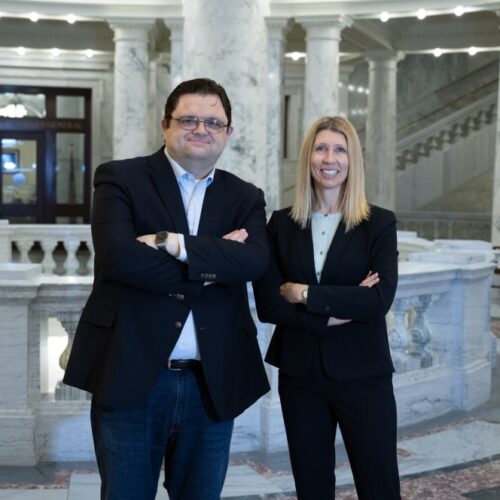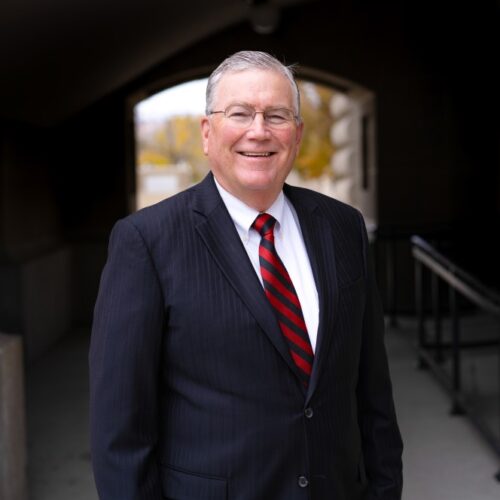Idahoans have diverse opinions to share. And having access to those opinions helps Idaho legislators and others address matters impacting the state.
Since 2016, Boise State’s Idaho Policy Institute and the School of Public Service have aimed to satisfy both needs with the annual Idaho Public Policy Survey.
The survey asks 1,000 Idahoans across the state to give their opinion on a variety of issues relevant to Idaho.
“Our aim is to be an objective research resource for Idaho’s decision makers,” said Vanessa Fry, Idaho Policy Institute director and School of Public Service research faculty member.
When the Idaho Policy Institute opened in 2016 as part of the new School of Public Service, one of its first efforts was reviving the public survey that the university had conducted in the past.
“We recognized that the survey was a valuable resource, and we worked with the university to determine a way to fund it internally,” Fry said. “Because we felt it was a huge benefit, not just to the Statehouse, but the state in general.”
A school-wide effort

Creating the survey is an intensive process of information gathering. It starts with queries to policymakers about upcoming legislative agendas and unresolved issues from the past session.
“We want to make sure that what we’re surveying is useful to the policymakers when they’re debating,” said Matthew May, survey research director and Idaho Policy Institute research scholar.
Once the team has gathered and sorted responses, the work of developing questions begins, which Fry calls “a whole School of Public Service effort.” The team decides what questions should be repeated each year, a tactic that shows trends in opinions on important issues. The yearly “report card” question asks whether things in Idaho are generally headed in the “right” or “wrong” direction. Other perennial questions include what policies the Legislature should address and how Idahoans feel about property taxes, growth and tax relief.
“We’re starting to develop some interesting historical data,” May said. “You can see what’s on the minds of the average Idahoan this year versus two years ago, and you can see that shift over time.”
In service to the public
The survey is just one part of what the institute aims to accomplish. Fry said that often lawmakers will ask for follow-up research on some issue from the survey. The institute will work with those lawmakers to identify the core issue and help set up a research project.
In 2022 for example, the governor’s office had questions about survey data on housing affordability across the state. The institute created a housing dashboard in response, which ultimately helped the state allocate $50 million of American Rescue Plan Act funds for workforce housing.
“Legislators know this is a resource they can use to inform their decision-making process, but it’s not making their decision for them or advocating a particular position,” May said. “We try to be conscious of the service role of the survey, and I do believe they appreciate that.”
From the dean
Angie Bos became the dean of the School of Public Service in the summer of 2022.
“One of the missions of the School of Public Service is to be a trusted resource for policy makers,” Bos said. “Our annual survey is part of that mission. It’s important that it comes from our research professionals who are independent and non-partisan.”
The survey is also valuable for Boise State researchers, Bos added. Questions in the newest survey, such as those about salmon habitat and public services available for crime victims, will inform faculty research on campus.
One lawmaker’s perspective

Vanessa Fry said School of Public Service researchers work with lawmakers like Lt. Gov. Scott Bedke who provide feedback on topics they believe may come up during the legislative session.
Bedke, a lawmaker for more than two decades, was speaker of the Idaho House of Representatives for 10 years before becoming lieutenant governor in 2023.
“As a legislator, I have gone through the survey every year. Other legislators do as well,” Bedke said.
Legislators can fall into “echo chambers” where their views are reinforced by people in their districts. As speaker of the house, he didn’t have that luxury, he said. The public policy survey helped him take a broader view of the opinions of Idahoans.
This year’s survey “reinforced that people who have moved to Idaho recently are pretty well aligned with the Idaho of the past 50 years,” Bedke said, and that as they have been in past surveys, Idahoans are most concerned about education and the economy.
“The two things go hand in hand. You need a quality educational system to have a healthy business climate. That fact is being more widely recognized and the survey buttressed my position,” he said.
This year’s survey found that while a majority of Idahoans believe the state is heading in the right direction, that majority is smaller than ever.
“As lieutenant governor I’m going to try to get to the bottom of that,” Bedke said.
Among other survey results, Bedke noted that 82% of Idahoans favor eliminating the grocery tax. The issue is complicated, Bedke said, because Idahoans have received a tax credit for groceries since the 1960s and eliminating the tax would have other consequences. The survey reveals where Idahoans need more information on issues.
“These surveys are beneficial to help us fine tune our message and get better aligned with the body politic,” Bedke said.
He believes that while there’s “never perfect cause and effect,” the annual survey does “move the needle over time” for legislators. “Anyone in elected office cannot for long ignore the trends from their voters.”
Some findings from the newest survey
• Overall, Idahoans (46%) believe the state is heading in the right direction, but many (41%) disagree. The gap between these two views has gone from 30 points in 2019 to five points this year.
• Political engagement in Idaho is high relative to national numbers. Nearly one-third (32%) of Idahoans report they have contacted a public official within the last year.
• Idahoans’ legislative priorities remain unchanged from previous years, with education the top issue for lawmakers to address. Housing saw the largest increase in priority ranking over last year.
Read the full 2022 Idaho Public Policy Survey
By Jodie Nicotra